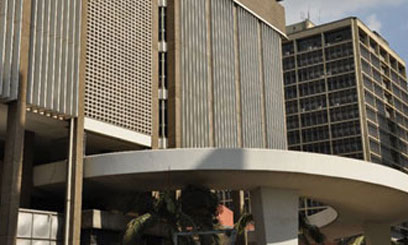
the committee hoped that holding the Central Bank Rate (CBR) at 18 percent would ensure that inflation continues to decline/FILE
In its meeting on Wednesday, the Monetary Policy Committee observed that despite the positive developments such as easing inflation, a stable foreign exchange and the gradual slowing of private sector credit, potential risks in the economy attributed to high energy prices and a widening current account deficit still persist.
“Non-food non-fuel inflation, an inflation measure that reflects the impact of the monetary policy stance being pursued, is still above the government short-term inflation target of nine percent for the fiscal year 2011/12,” said CBK Governor Njuguna Ndung’u.
“The wide current account deficit and rising crude oil prices attributed to a geo-political risk premium remain a threat to both continued exchange rate stability and further easing of inflation pressure,” he added.
However, the committee hoped that holding the Central Bank Rate (CBR) at 18 percent would ensure that inflation continues to decline towards the single digit levels.
The governor added that CBK interventions particularly in the interbank market would also continue to reduce the volatility in (interbank) rates and bring it closer to the CBR.
Standard Chartered Bank Head of Regional Research for Africa Razia Khan opined that this statement (of intervening in the interbank market) implied a moderate amount of easing, occasionally adding liquidity with a view to boosting the operational aspects of the CBR.
“With this statement we have clear parameters for what would need to change to make the CBK more comfortable with easing,” Khan argued.
However, notwithstanding the concerns about the delay in the long rains, the economist pointed to the decelerating inflationary pressures saying its supports their call for the relaxation of the stance in the second half of the year.
“This is still good news – ultimately – for the rates market,” she emphasised.
Earlier, fund managers at PineBridge Investments had rightfully predicted that high interest rates would be a regular fixture at least for the first half of this year.
PineBridge Investments manager Joel Warutere had noted that significant risks to the economy from external shocks would be a major reason for the committee to hold its view.
“There is pressure for interest rates to decline although we see this as a very gradual process. We expect a decline in the second half of 2012 as the inflation levels ease,” he said.
Other indicators such as the 91-day Treasury bill rate dropping from 19.9 percent in December last year to 16.7 percent at the end of March skewed sentiments in the market towards reduced interest rates.
“The primary auctions in the quarter were heavily over-subscribed as investors sought to lock in high interest rates, with expectations that the declining inflation rates would trigger a drop in interest rates further fuelled the scramble for the short term securities,” Warutere explained.
Meanwhile, economic growth for 2012 is set to remain muted with analysts forecasting it to rest between four and 4.5 percent driven primarily by public spending on infrastructure and recovery in agriculture.
Still, factors such as a sustained restrictive monetary policy putting negative momentum on credit growth and adverse weather forecasts affecting agricultural output could threaten growth prospects.
Outlook for the stock market is promising after recovering at the turn of the year on the back of strong earnings announcements for the year ended 2011 and attractive valuations that drew sizeable participation from foreign investors.
“The results announcements for 2011 financial year were strong surprising the market on the upside led by the banking sector. Revenues in the banking sector rose by 19 percent while profits rose by 24 percent,” Warutere said.
However the equity markets’ continued bullish run will be heavily dependent on the pace of interest rates decline and impending political transition as the election date remains a major bone of contention.


































